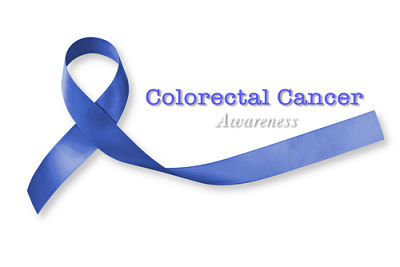
Colorectal Cancer Awareness written above a blue awareness ribbon
COLORECTAL CANCER: KNOW YOUR RISKS
Colorectal cancer is the third most common cancer in the U.S., not including skin cancers. There are about 132,000 new cases each year and it affects about one in every 20 people. Who's at Risk?
People at risk include those over age 50 who have a family history of colorectal cancer, ulcerative colitis, Crohn's disease, or colorectal polyps. You're also more likely to develop it if you smoke or eat a high-fat diet.
What Are the Symptoms?
You may not have any symptoms. That's why regular screening tests are so important.
If you do have symptoms, they may include:
• Constipation or diarrhea
• Bright red or dark blood in your stool
• Feeling full or bloated
• Frequent, painful gas or cramps
• Unexplained weight loss
• A feeling that your bowel doesn't empty completely
How is it diagnosed?
• Your doctor may give you a full physical and feel your abdomen for any enlarged organs or masses. He may also perform a digital rectal exam to check for anything that's not normal. Lastly, he may order a stool or blood test.
• If you're at risk for colorectal cancer, or if the results suggest you might have it, your doctor will likely order a colonoscopy. This is a procedure for examining the whole colon and rectum with a thin, flexible tube. The tube has a small video camera on one end that lets the surgeon or gastroenterologist see the inside of your colon on a display monitor. He may also biopsy parts of your large intestine or remove polyps during the procedure.
Can It Be Prevented?
There are many ways to reduce your risk for colorectal cancer. Here are a few:
• Get the proper screening tests. Talk to your doctor about when you should start.
• Eat a fiber-rich diet that includes plenty of fruits, vegetables, and whole grains, and avoid red and processed meats.
• Exercise every day.
• Maintain a healthy weight.
• Limit your alcohol consumption.
• If you smoke, quit.
How Is Colorectal Cancer Treated?
The most common way to remove colon cancer is through surgery. Other treatments include:
• Radiofrequency ablation -- Kills cancer cells using a probe with electrodes
• Cryosurgery -- Freezes and destroys abnormal tissue
• Chemotherapy -- Stops the growth of cancer cells with drugs
• Radiation -- Kills the cells with high-energy X-rays
• Targeted therapy -- Uses drugs or other substances to attack cancer cells without damaging healthy ones
Talk with your doctor about screening tests for colorectal cancer. If you are having any symptoms, contact your local physician or call Sabetha Family Practice at (785) 284-2141 and make your appointment today!
